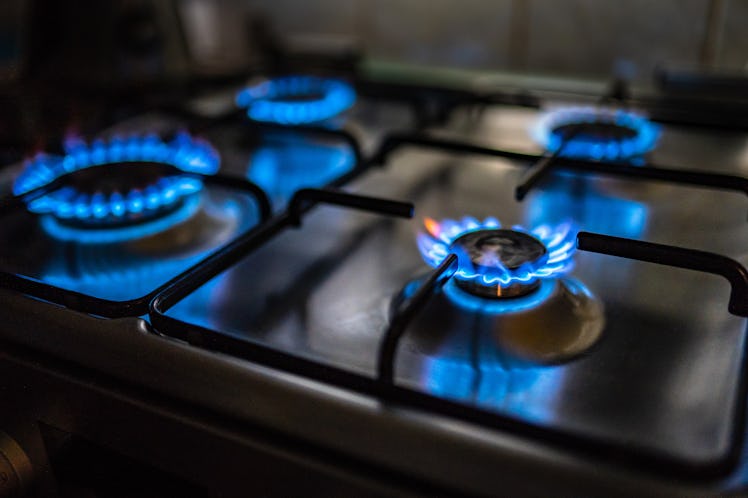New Study Finds Gas Stoves Release Toxic Chemicals — Even When Turned Off
Ninety-five percent of the gas stoves tested released the carcinogen benzene.

Gas stoves have long been a sought-after kitchen upgrade, but a new study shows that cooking with gas isn’t all it’s cracked up to be — and is actually dumping toxic chemicals into the air inside your home.
Scientists have long known that methane from gas ranges is a significant contributor to the greenhouse gas methane, but methane isn’t the only problematic chemical gas stoves give off. A new study published in the journal Environmental Science & Technology explains that it’s not just natural gas that comes out of your burner, but known carcinogens and other toxic chemicals too. The researchers found that natural gas contains a number of air toxics — a special EPA categorization for chemicals known to cause cancer and other serious health problems.
“It is well-established that natural gas is a major source of methane that's driving climate change,” lead study author Drew Michanowicz, a visiting scientist at Harvard Chan C-CHANGE, senior scientist at PSE Healthy Energy, said in a statement. “But most people haven’t really considered that our homes are where the pipeline ends and that when natural gas leaks, it can contain health-damaging air pollutants in addition to climate pollutants.”
To determine levels of toxic compounds present in natural gas, researchers from the Harvard T.H. Chan School of Public Health evaluated 200 unburnt natural gas samples collected from 69 stoves and pipelines in the Boston metro area between December 2019 and May 2021. They found that the samples contained at least 21 air toxics.
In many cases, odorants used to alert homeowners to a gas leak were undetectable in small leaks, meaning gas leaks go unrealized, compromising indoor air quality.
“This study shows that gas appliances like stoves and ovens can be a source of hazardous chemicals in our homes even when we’re not using them. These same chemicals are also likely to be present in leaking gas distribution systems in cities and up the supply chain,” said Jonathan Buonocore, co-author of the study and a research scientist at Harvard Chan C-CHANGE, in a press release for the study.
The research team found concerning levels of many toxic compounds, including benzene, which is a known carcinogen that affects red and white blood cells. It can cause anemia and negatively impact immune function. Benzene is heavily regulated, and, according to the study, there is no safe level of exposure to benzene. Yet 95% of the natural gas samples evaluated contained benzene.
Other compounds found in the samples include methane, ethylbenzene, xylene, toluene, and many other pollutants categorized by the EPA as hazardous. These chemicals are leaking into the homes of families everywhere and negatively affecting indoor air quality, potentially causing severe health problems or exacerbating existing conditions.
In recent years, there has been a push to remove gas stoves and ovens from homes and replace them with electric appliances. But that’s not a budget item many families can afford right now. If it’s not feasible for your family, experts recommend turning on a ventilation fan or hood before you light your burner — not just after the burner is lit.
This article was originally published on